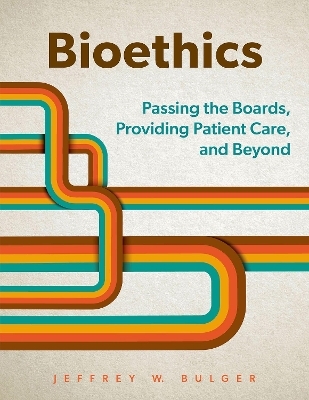
Bioethics
Oxford University Press Inc (Verlag)
978-0-19-777219-5 (ISBN)
- Lieferbar (Termin unbekannt)
- Versandkostenfrei innerhalb Deutschlands
- Auch auf Rechnung
- Verfügbarkeit in der Filiale vor Ort prüfen
- Artikel merken
This innovative resource presents sixty topics designed to educate and captivate medical and healthcare students and practitioners. Each issue focuses on high-yield content crucial for medical licensing exams for all medical practitioners. The book is an essential reference for clinical practice, ethics consultations, and academic writings.
While the ethical issues discussed may spark varied opinions rooted in personal, religious, or political beliefs, the book draws from moral positions issued by various medical professional organizations, offering a framework for behavioral expectations within the medical community. By immersing themselves in the moral mystery stories, the ethical analysis, and applying the acquired knowledge to review questions and the NBME-style clinical vignettes, healthcare professionals will gain the necessary tools and skills to adhere to ethical and legal standards of care in their practice. Engage in this thought-provoking exploration of medical ethics and emerge well-equipped to navigate the challenges of making life-altering decisions.
Jeffry W. Bulger, PhD, HEC-C has enjoyed a distinguished career as a Professor of Philosophy and Director of Bioethics and Humanities. Celebrated for his deep knowledge of Biomedical Ethics, Philosophy of Science, and Applied Ethics, he is renowned for his dynamic teaching style and significant contributions to student success, earning him a place in the prestigious Master Teacher Guild. Beyond his academic roles, Dr. Bulger has been a pivotal figure in shaping both educational and clinical policies, always with an unwavering commitment to ethics and interdisciplinary collaboration. His research focuses on ethical aspects of medical decision-making and informed consent has been influential in both fields. Dr. Bulger's commitment to diversity and inclusivity has always been at the forefront of his teaching and research, embracing various learning styles and socio-economic backgrounds. His belief in lifelong learning and professional development extends beyond his professional life, reflecting his personal philosophy about the transformative power of education. Through his writings, Dr. Bulger extends an invitation to his readers to join him in this enriching journey, offering the wisdom and insights gleaned from a rich and fulfilling career. His ongoing commitment to education and ethics not only shapes the minds of his students but also contributes to the broader discourse in his fields of expertise.
SECTION 1: FOUNDATIONAL TOPICS
Chapter 1: The Four Principles
Chapter 2: The Belmont Report - Abridged
Chapter 3: The Hippocratic Oath
Chapter 4: The Declaration of Geneva
SECTION 2: 60 TOPICS
Chapter 5: Abortion
Chapter 6: Abuse: Child, Elder, and Intimate Partner
Chapter 7: Addressing Oneself and Patient
Chapter 8: Advance DirectivesDLPlanning
Chapter 9: Assisted Suicide
Chapter 10: Capital PunishmentDLExecutions
Chapter 11: Chaperones and Personal Privacy
Chapter 12: Confidentiality
Chapter 13: Conflict of Interest
Chapter 14: Contraception
Chapter 15: Death with Dignity and Assisted Dying
Chapter 16: Disagreements: Attending v. Resident
Chapter 17: Do-not-resuscitate (DNR), DNAR, AND
Chapter 18: The Doctrine of Double Effect
Chapter 19: Email and Electronic Communication
Chapter 20: Errors
Chapter 21: Euthanasia
Chapter 22: Financial Disclosures
Chapter 23: Futile Treatment
Chapter 24: Genetic Information Nondiscrimination Act
Chapter 25: Gifts
Chapter 26: Gunshot Wounds
Chapter 27: Hospice
Chapter 28: Immunization - Vaccine Hesitancy
Chapter 29: Impaired Driver
Chapter 30: Impaired Practitioner
Chapter 31: Interrogation
Chapter 32: Lifelong Learning
Chapter 33: Malpractice
Chapter 34: Media Communications
Chapter 35: Medical Records
Chapter 36: Minor Patients
Chapter 37: Nurses and Allied Health Professionals
Chapter 38: Organ Donations
Chapter 39: Palliative Care
Chapter 40: Patient-Practitioner Relationship
Chapter 41: Practitioner Disagreements
Chapter 42: Precision Medicine
Chapter 43: Pregnant Patients
Chapter 44: Product Sales
Chapter 45: Racial Concordance
Chapter 46: Referrals and Fee-Splitting
Chapter 47: Reportable Infections and Illnesses
Chapter 48: Research and Clinical Equipoise
Chapter 49: Research on Human Subjects
Chapter 50: Self and Family Treatment
Chapter 51: Sexual Boundaries
Chapter 52: Sexually Transmitted Infections (STI)
Chapter 53: Social Media Boundaries
Chapter 54: Sterilization
Chapter 55: StrikesDLUnionization
Chapter 56: Structural Injustice
Chapter 57: Student Patient Care
Chapter 58: Surrogate Decision-Making
Chapter 59: Telemedicine
Chapter 60: Terminal and Palliative Sedation
Chapter 61. Testimonials and Quackery
Chapter 62: Torture
Chapter 63: Triage
Chapter 64: Withholding and Withdrawing Treatment
Appendix 1: Step Exams
Appendix 2: Glossary
| Erscheinungsdatum | 08.09.2024 |
|---|---|
| Verlagsort | New York |
| Sprache | englisch |
| Maße | 218 x 284 mm |
| Gewicht | 1361 g |
| Themenwelt | Medizin / Pharmazie ► Medizinische Fachgebiete ► Medizinethik |
| Studium ► Querschnittsbereiche ► Geschichte / Ethik der Medizin | |
| Naturwissenschaften ► Biologie | |
| ISBN-10 | 0-19-777219-6 / 0197772196 |
| ISBN-13 | 978-0-19-777219-5 / 9780197772195 |
| Zustand | Neuware |
| Informationen gemäß Produktsicherheitsverordnung (GPSR) | |
| Haben Sie eine Frage zum Produkt? |
aus dem Bereich


